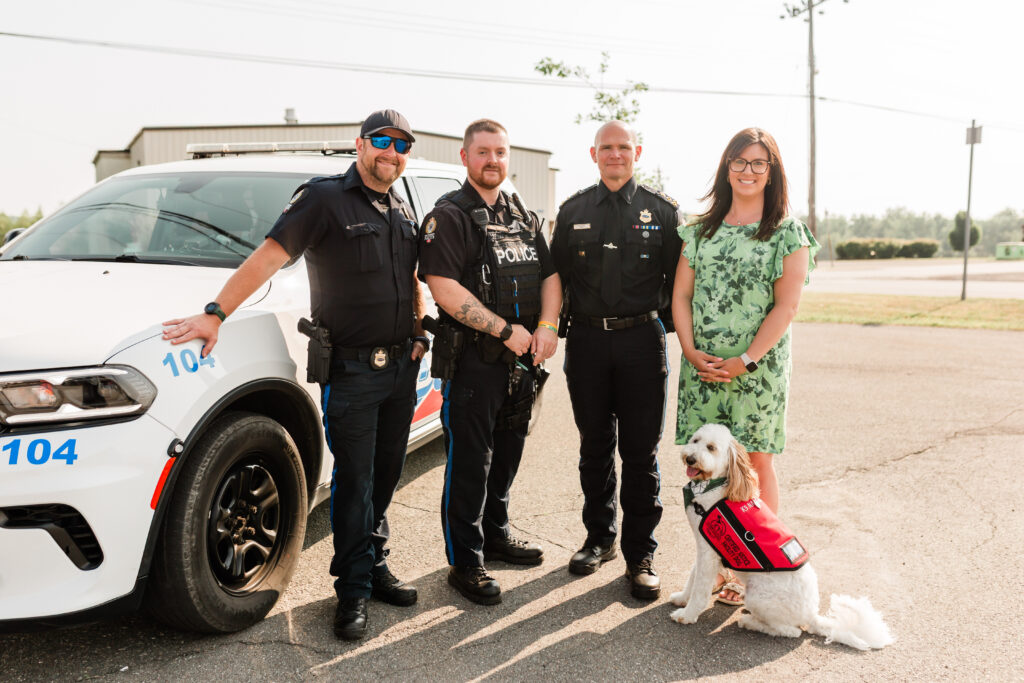New Glasgow, Nova Scotia, Wednesday, February...
Bridging the gap: A collaborative approach to crisis response in Pictou County
New Glasgow, Nova Scotia, Tuesday, July 29, 2025, …. When the first Mental Wellness Roundtable was held in Pictou County, it wasn’t launched with a major investment or a detailed blueprint. It began with a small start-up grant from the Aberdeen Health Foundation and a desire from local Community Health Boards to get people from various organizations and agencies talking.
“It was there at one of those first Roundtables that Police Officer Ryan Leil raised the alarm about the surge in mental health-related calls,” recalls Michelle Ferris, Executive Director of the Aberdeen Health Foundation. “Kevin Fraser, a manager from Mental Health and Addictions, was present, and that’s where the seed for the Crisis Intervention Team (CIT) program was really planted.”
Developing a Collaborative Approach
That early conversation sparked a partnership between New Glasgow Regional Police and Nova Scotia Health’s Mental Health and Addictions team. The result: a CIT program designed to help first responders and clinicians work together to better support people in crisis.

Photo caption: A Crisis Intervention Team (CIT) training session in progress with New Glasgow Police. CIT is a collaborative program between police and Nova Scotia Health’s Mental Health and Addictions team that helps first responders support people in mental health crisis. Officers complete a 40-hour course that includes scenario-based learning, input from mental health professionals, and perspectives from people with lived experience.
“It has really been an evolution since we first started talking about this, back in 2020,” says Ryan Leil, now Chief of Police for New Glasgow Regional Police. “Once we started sitting down and learning what each other actually does, we saw the potential to do things differently.”
CIT is what’s known as a co-response model, an approach that sees police and mental health professionals collaborating in real time.
“We were really working in silos,” explains Carly MacCuspic, a Clinical Therapist in Mental Health and Addictions with Nova Scotia Health. “I was working over here in the mental health department, they were working in community, and oftentimes we were interacting with the same people, but weren’t able to collaborate and talk to each other.”
The CIT training Carly now delivers aims to shift that. Officers take part in a 40-hour course featuring input from psychiatrists, role-playing scenarios with actors, and lived-experience speakers.
“We draw from psychiatry expertise from across the province. We have local actors that come in and do scenario-based learning. We bring in first voice perspectives, so people who live with mental illness can speak about their experiences, both good and bad, with the police.”
Training and Support in Action
The program is internationally recognized, and Pictou County was the first community in Nova Scotia outside of Halifax to implement CIT training.
Once trained, officers can consult with mental health clinicians directly through a dedicated phone line.
“They can call our crisis team and directly consult with a crisis clinician. We can provide them with recommendations and follow-up appointments. It just reduces barriers for people experiencing a crisis to access the services they need,” Carly explains.
The real-world benefits of this approach are becoming more and more visible. Carly recalls one instance: “I got a call from one of our CIT officers with New Glasgow Police late in the morning. He walked me through the situation and said the person was open to coming in for an appointment. They had already talked through a safety plan, so there wasn’t a need to go to the emergency department. I happened to have a cancellation that afternoon, and the person was able to come in for an assessment at 1:30 that same day.”
That kind of same-day response would have been far less likely before the program.
“Before this program existed, we might’ve had to apprehend them under the Involuntary Psychiatric Treatment Act,” says Ryan. “In those cases, we would physically bring them to the emergency department and sit with them until they were seen.”
These types of apprehensions were not only distressing for the person in crisis, they also placed strain on hospital and police resources.
“Now we can say it’s unnecessary because we have alternatives,” Ryan adds. “Apprehending somebody and taking them to the hospital versus connecting them with Mental Health and Addictions over the phone, in their own home… we’re seeing a less intrusive response by police. That’s building trust with the community.”
The coverage is comprehensive. “We have crisis coverage 365 days a year,” Carly says. “The in-person team covers regular business hours Monday to Friday, and then evenings, weekends, and holidays are covered by the virtual crisis team.”
The most recent CIT trainings have also included EHS and first responders, further expanding the circle of support available to individuals in crisis.
From December 2022 to May 2025, the New Glasgow Police Department made 101 CIT-supported calls, and only five resulted in a trip to the emergency department. Over the same period, police responded to more than 1,900 mental health and wellbeing-related calls, meaning less than 0.3 per cent resulted in hospital visits.
“The numbers have drastically declined in terms of how many times we’re having to attend the emergency department,” says Ryan.
The CIT model has grown steadily in Pictou County. “We started in December 2021 with training five of our officers. Now we’re at over 50 percent capacity,” Ryan says. “We have a CIT-trained officer on uniform patrol 24 hours a day.”

Photo caption: From left: Cst. Donnie Wadden, NGRP School Resource Officer; Cst. Daniel Worth, NGRP Patrol Division; Chief Ryan Leil; Carly MacCuspic, Crisis Response & Urgent Care Services – Crisis Intervention Team (CIT) Coordinator, Mental Health and Addictions, Nova Scotia Health; and Napolean, New Glasgow Regional Police Facility Support Dog. The group works together to support people in mental health crisis through the CIT program.
Data from the past year shows that the percentage of mental health-related calls involving a CIT response has more than doubled since the early phases of the program. While not every call requires a CIT response, the steady increase suggests officers are recognizing its value and gaining confidence in the model.
Navigating Legal and System Challenges

Photo caption: From left: Kevin Fraser, Mental Health & Addictions Manager, Outpatient & Urgent Care; Carly MacCuspic, Crisis Response & Urgent Care Services – Crisis Intervention Team (CIT) Coordinator; Ashlie Cormier, Senior Policy Analyst, Health Promotion, Mental Health & Addictions Community Wellness Supports; and Constable Destiny Merriam, New Glasgow Regional Police. Fraser and Cormier were instrumental in resolving the legal barriers that needed to be addressed for the CIT program to move forward.
Of course, a partnership like this doesn’t come together without effort. “In order for us to actually collaborate, we had to jump through a lot of hoops,” Carly says. “There’s so many legal challenges associated with being able to work with different departments effectively.”
One of the major hurdles was around information sharing. “The reason why we’re able to collaborate between us and police is because we have a ministerial authorization from the Department of Health that says we can communicate across departments without the concerns of confidentiality,” Carly explains, noting that her manager, Kevin Fraser, and her colleague, Ashlie Cormier, were instrumental in getting those authorizations in place.
“When I think about what it took to bring this program to life, I’m genuinely humbled,” adds Michelle. “No one said ‘that’s not my job’. People from different departments, organizations, and roles all stepped up and worked together to make it happen. We expect policing services to respond correctly 100% of the time. Our local forces are going to incredible lengths to improve outcomes for people in crisis, and I think that’s worth shining a light on.”

Photo caption: The CIT lapel pin is worn by officers who have completed specialized crisis response training. It reflects the partnership between police and health services, and a shared commitment to supporting people facing mental health challenges with care and respect. The pin also serves as a visible reminder to the public and to fellow officers of a thoughtful and collaborative approach to crisis response.
Ongoing Collaboration and Community Impact
“You start to understand why someone does something the way they do it,” says Ryan. “When you better understand it, you can come up with ideas to better support one another.”
For the Aberdeen Health Foundation, that kind of collaboration is exactly what community health investment is meant to support.
“Our role is to be the bridge, linking the community, health system, and government,” says Michelle. “When you bring people together and leverage that connection, anything is possible.”
While the funding needed for these training sessions is modest, the ripple effect is immense. “This can be the power of a small donation,” Michelle says.
For Ryan, the hope is to keep momentum going. “We’re seeing success in emphasizing de-escalation and communication,” he says. “It’s growing and continues to grow. This wasn’t something handed to us, we built it from the ground up – and now it’s something that’s bigger than all of us.”
The Aberdeen Health Foundation is the leading charity for enhancing health care in Pictou County. In 2024, the Foundation invested over $2.7 million to fund medical equipment and enhance health programs at the Aberdeen Hospital and in the community. Your contribution can be the catalyst for even greater change — find out how you can make an impact here.
FOR MORE INFORMATION CONTACT:
Megan Manuel Murphy
Administrative Coordinator
Aberdeen Health Foundation
902-752-7600 ext. 4600
Megan.ManuelMurphy@nshealth.ca